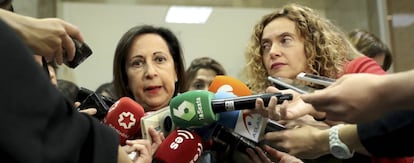Socialists call on government for full explanation of Russian interference in Catalonia
Congressional group requests appearance of Deputy PM Sáenz de Santamaría in official secrets commission

The main opposition Socialist Party (PSOE) has called on the deputy prime minister, Soraya Sáenz de Santamaría, to appear in the parliamentary commission of official secrets to offer a full explanation of interference by other countries in the Catalan independence drive. “We want to be informed of all possible foreign interference in Catalonia, if it existed and what actions have been taken from the government and the CNI [Spanish secret service] to clarify it,” said on Thursday Margarita Robles, the spokesperson of the Socialist group in Congress.
The foreign activity could have had a “significant effect” on the political situation in Catalonia, Robles added, in reference to the activity that has been detected from Russian territory, which has included the spread of “fake news” and exaggerated stories.
We want to be informed of all possible foreign interference in Catalonia Margarita Robles, the spokesperson of the Socialist group
“The fact that the risk exists – as we have been informed fundamentally via media outlets – of this possible foreign interference requires for us to be informed,” Robles continued. The Socialist group has chosen the Reserved Expenses commission (commonly known as “official secrets”) given that it is, in Robles’ words, the appropriate “framework of seriousness and rigor” for the deputy prime minister – who is responsible for the CNI – to supply “all of the information that the government has and what it has done to avoid this interference,” Robles said. “Our understanding is that this is not a question of government, but of state,” she added.
The Spanish government confirmed last Friday that there had been foreign intervention via social networks aimed at benefiting the pro-independence narrative. “This is a serious issue, where democracy has to face up to the challenge of new technologies,” Popular Party (PP) government spokesperson Íñigo Méndez de Vigo said. “The [Spanish] government has confirmed that a lot of the messages and interventions that have come via social networks are from Russian territory,” said last week María Dolores de Cospedal, the defense minister. “That is not to say necessarily that they are from the Russian government.”
This is a serious issue, where democracy has to face up to the challenge of new technologies Íñigo Méndez de Vigo, PP spokesperson
The issue is also on the radar of the European Union and the US State Department. “We are, of course, very concerned about the allegations of Russian interference in events in Spain,” an American spokesperson said.
The controversy has already prompted a response from Russia, which has demanded “concrete facts.” Maria Zajarova, the spokesperson of the Russian Foreign Affairs Ministry, has called on the Spanish government to provide evidence of interference. “Russia deeply regrets that the wave of anti-Russian campaigns that have been unleashed in Western media have been elevated by Madrid to an official level in the context of the Catalan crisis,” she said. Zajarova also warned that the accusations could damage bilateral relationships.
English version by Simon Hunter.
Tu suscripción se está usando en otro dispositivo
¿Quieres añadir otro usuario a tu suscripción?
Si continúas leyendo en este dispositivo, no se podrá leer en el otro.
FlechaTu suscripción se está usando en otro dispositivo y solo puedes acceder a EL PAÍS desde un dispositivo a la vez.
Si quieres compartir tu cuenta, cambia tu suscripción a la modalidad Premium, así podrás añadir otro usuario. Cada uno accederá con su propia cuenta de email, lo que os permitirá personalizar vuestra experiencia en EL PAÍS.
¿Tienes una suscripción de empresa? Accede aquí para contratar más cuentas.
En el caso de no saber quién está usando tu cuenta, te recomendamos cambiar tu contraseña aquí.
Si decides continuar compartiendo tu cuenta, este mensaje se mostrará en tu dispositivo y en el de la otra persona que está usando tu cuenta de forma indefinida, afectando a tu experiencia de lectura. Puedes consultar aquí los términos y condiciones de la suscripción digital.









































